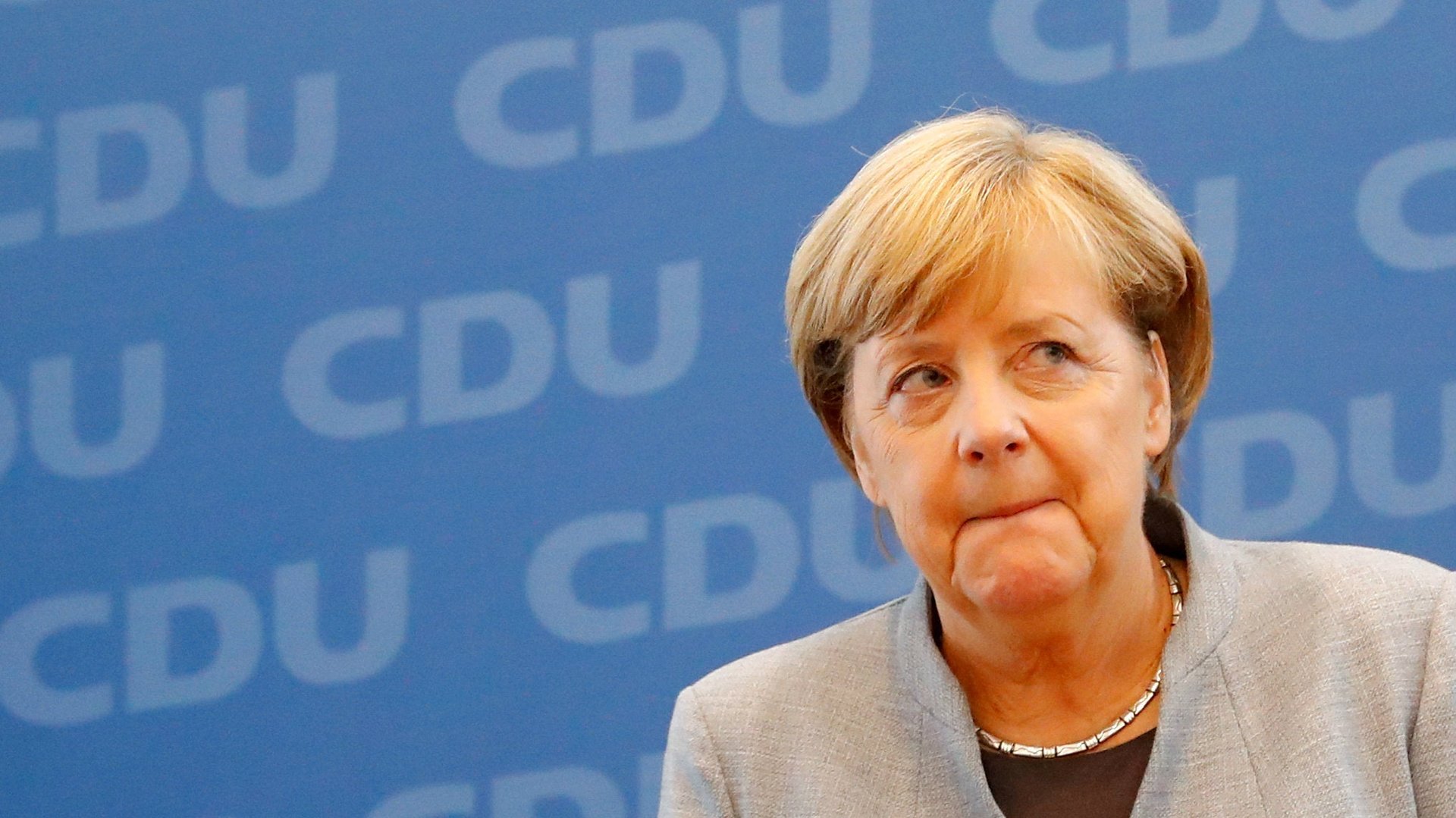The euro is falling after Angela Merkel’s “nightmare victory” in the German election
On Sunday, Angela Merkel secured her fourth term as German chancellor. But instead of celebrating, Merkel, the German media, and financial markets all seem to agree that it was a hollow victory.


On Sunday, Angela Merkel secured her fourth term as German chancellor. But instead of celebrating, Merkel, the German media, and financial markets all seem to agree that it was a hollow victory.
Merkel’s Christian Democratic Union and Christian Social Union (CDU/CSU) received 33% of the vote and will get 246 seats in the 672-seat parliament, which isn’t enough to form a majority government. Although it got the largest share of the vote by some distance, the center-right alliance’s vote share declined by 8.5% from the 2013 election. Meanwhile, the far-right Alternative for Germany (AfD) party saw its share jump to 13%, and will get 94 seats in parliament, having never won any before. A nationalist party is now the third-largest in Germany, back in parliament for the first time since the Second World War.
In her victory speech, Merkel said she hoped for a “better result.” The front page of German tabloid Bild declared it a “Nightmare Victory” and the euro fell against the dollar as foreign-exchange markets opened late on Sept. 24 in Europe.
Germany’s second-largest party, the center-left Social Democrats (SPD), also had a bad night, with its share of vote falling to a postwar low.
Even with Merkel still at the helm, the election result is messy and likely to unnerve investors. The euro was down 0.6% against the dollar at the time of writing. The SPD have ruled out going into a coalition with the CDU/CSU (which they had been in since the 2013 election). This now leaves Merkel scrambling to form a more complicated coalition with smaller parties: The most likely scenario is a coalition with the Free Democrats (FDP) and the Greens. She could also try to run a minority government, but that would be unprecedented in consensus-driven German politics in the postwar period.
Analysts at Bank of America Merrill Lynch point out that both of Merkel’s options are likely to lead to policy uncertainty and an unstable government that could lead to early elections. “Market perception of highly predictable and stable German politics may be challenged,” the analysts wrote in a research note.
Despite the election results, the AfD do not have a strong foothold in the German parliament. All other political parties have ruled out working with them, and protests against the nationalist party broke out across Germany after the vote. This morning, Frauke Petry, the co-chair of the AfD stunned many by suddenly announcing she wasn’t going to join her party colleagues in parliament. Petry represented a somewhat more moderate faction of the party and urged her colleagues to appear less rightwing.
This election continues the trend seen across Europe recently: a decline in support for the traditional main parties, particularly on the center-left, and a surge in support for smaller parties on the more extreme ends of the left-right political spectrum. Strategists at Société Générale warn that the increase in support for the AfD and FDP could make Germany’s EU policies “more cautious and restrictive, irrespective of which coalition takes office.”
Until a government coalition is secured, the euro could see more wobbles. For now, the decline is limited by what is still a strong European economy (pdf). That said, the rise of the AfD in Germany could make investors more nervous about future political turmoil elsewhere in Europe, which has been somewhat subdued since Emmanuel Macron’s victory in France earlier this year. In Italy, the anti-establishment Five-Star Movement has been seeing a leap in the polls ahead of elections early next year.